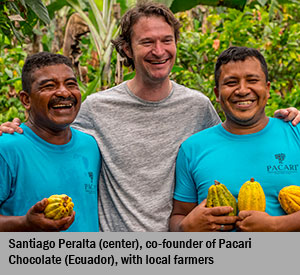Member Spotlight: Pacari Chocolate—A Sweet Business Model Delivering Social, Environmental, and Economic Benefits
Published: February 1, 2019
Maria Kyriakou Makylo IP Services Lefkosia, Cyprus
When I met Santiago Peralta, an Ecuadorian lawyer, during INTA’s 2018 Annual Meeting in Seattle, Washington, he offered me a PACARI brand bar of premium dark organic chocolate instead of handing me his business card. It made perfect sense.
 In 2002, Mr. Peralta and his wife, Carla Barbotó, co-founded Pacari Chocolate (Ecuador). At the time, they considered two facts: (1) Ecuador cultivates and produces the world’s finest cacao; and (2) his homeland supplies the international chocolate industry with cacao. Consequently, they came up with the brilliant idea to manufacture the first-ever premium organic chocolate at its origin, bring it to the world market, and return the benefits to the Ecuadorian people. The PACARI brand business model and its relationship with its stakeholders exemplifies the principles of corporate social responsibility (CSR).
In 2002, Mr. Peralta and his wife, Carla Barbotó, co-founded Pacari Chocolate (Ecuador). At the time, they considered two facts: (1) Ecuador cultivates and produces the world’s finest cacao; and (2) his homeland supplies the international chocolate industry with cacao. Consequently, they came up with the brilliant idea to manufacture the first-ever premium organic chocolate at its origin, bring it to the world market, and return the benefits to the Ecuadorian people. The PACARI brand business model and its relationship with its stakeholders exemplifies the principles of corporate social responsibility (CSR).
Commitment to Corporate Social Responsibility
Pacari Chocolate’s commitment to benefit local producers-very small farms generally managed by a single family-underpins the company’s direct trade economic structure, and it is at the core of everything the brand does in the local communities where its ingredients are sourced.
From the beginning, this family-owned company developed personal relationships with the local growers of cacao and the other organic products that go into PACARI chocolate bars. This model, called “tree to bar,” guarantees the quality of raw material, and generates a virtuous circle by sharing the benefits of the business throughout the value chain. It starts with the meticulous care of the cacao plants, observing certified organic and biodynamic processes, and ensuring the purity and quality of all the ingredients that go into the final product. Currently, more than 3,000 local farmers benefit from the premium price of PACARI chocolate.
Focus on Inclusion and Sustainability
In addition to this direct commercial relationship that ensures greater income to the farming families, Pacari Chocolate’s close working relationship with local producers has allowed it to identify many other synergies and process improvements over the years, which have led to an enhanced quality of life in these communities.
For example, bearing in mind the important role of women in small family farms in Ecuador, Pacari Chocolate implemented the use of smaller bags for harvesting; by halving the weight of each bag (a simple but revolutionary and inclusive change that upended centuries of cacao farming tradition), it was possible to include women in the harvesting process, generating more opportunities for them and, in turn, higher incomes for their families. In another initiative, Pacari Chocolate provided hundreds of solar-powered flashlights to agricultural communities off the electricity grid, leading to a drop in the use of disposable batteries that could contaminate the soil.
In addition, Pacari Chocolate has joined in numerous social and environmental programs, including a recent alliance with the World Wildlife Fund (WWF), through which Pacari Chocolate uses an organic cacao from Amazonian communities in an exclusive line of its product, and invests a percentage of the profits in WWF-led conservation projects in Ecuador’s Amazon-basin region.
Pacari Chocolate’s direct relationship with local, small-farmer producers has generated a virtuous process with social, environmental, and economic benefits returning to the origins of the chocolate production cycle. The success of this business model encourages more producers of cacao-and those of other products-to pay attention to caring for Ecuador’s unique and highly biodiverse ecosystems.
Pacari Chocolate is aiming to make the world better through chocolate and cacao. The brand’s CSR is sweet and is making the daily life of thousands of Ecuadorian people much better.
A new column for the INTA Bulletin, and undertaken in alignment with the 2018-2021 Strategic Plan, which promotes CSR as one of its objectives, Member Spotlight highlights an INTA member organization’s CSR and/or philanthropy initiatives.
Although every effort has been made to verify the accuracy of items in the INTA Bulletin, readers are urged to check independently on matters of specific concern or interest.
© 2019 International Trademark Association